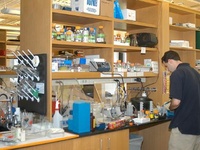“There are no known Communists on the Harvard staff, and I do not believe there are any disguised Communists either,” Conant wrote in his final presidential report.
“But even if there were,” he continued, “the damage that would be done to the spirit of this academic community by an investigation aimed at finding a crypto-Communist would be far greater than any conceivable harm such person might do.”
In the spring of 1953, the investigations touched Harvard when Robert G. Davies ’29, then a professor of English at Smith College, testified before the HUAC that he had been part of a communist cell of 15 faculty members when he taught at Harvard in the 1930s.
He provided at least ten names of people who had been in the cell with him, including Associate Professor of Physics Wendell H. Furry, who was still teaching at Harvard.
When Furry himself appeared before Velde’s committee in February and again in April, he told the HUAC he was not currently a member of the Communist Party, but did not answer questions about his activities before 1951, invoking his Fifth Amendment right to remain silent.
“It is my strong feeling that the Committee’s policy of interrogating persons on their private beliefs and associations is utterly inconsistent with American traditions of freedom,” he said in a statement to the press in February.
Two other faculty members also invoked the Fifth when questioned by Jenner’s congressional committee—Helen Deane Markham, assistant professor of anatomy, and Leon Kamin, a teaching fellow in the Social Relations department.
The Harvard Corporation decided to retain the three faculty members, concluding in May that Furry and Kamin were no longer affiliated with the Communist Party and Markham had never been a member.
In a statement, the Corporation reaffirmed that it did consider the use of the Fifth Amendment to be “misconduct, though not necessarily grave misconduct”—the latter being the offense for which a faculty member could be fired.
The statement went on to say that the University had little tolerance for faculty who were currently affiliated with the Communist Party.
“We would regard with the gravest concern the presence on our teaching staff today of a person who is now under the domination of the Communist party...It is beyond the scope of academic freedom,” the statement read. “In the absence of extraordinary circumstances, we would regard present membership in the Communist Party by a member of our faculty as grave misconduct, justifying removal.”
In June 1953, The Crimson published a special edition on academic freedom, in which editors reported that 100 professors across the nation had pleaded the Fifth while under investigation by Congress that year.
“Fifty-four had been dismissed or suspended from their jobs. Others were on probation or under official censure. All, according to polls of public opinion, had received the tacit condemnation of their fellow citizens,” The Crimson reported.
Harvard’s decision to keep the three faculty represented a significant move at a time when the use of the Fifth Amendment was widely considered to be an admission of guilt.
But in other cases involving non-tenured faculty, the University’s record was not as exemplary, despite the oft-told story of Harvard’s bravery against McCarthyism cited in Summers’ speech.
Read more in News
Pataki: 'Yale is Going to Crush Harvard'













